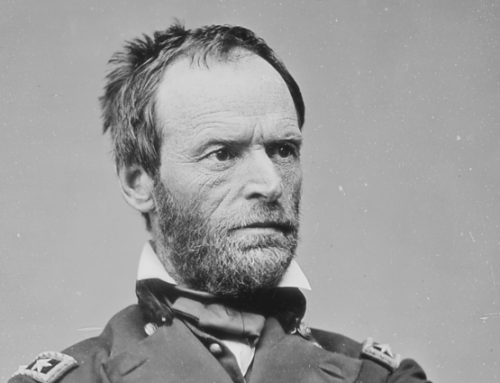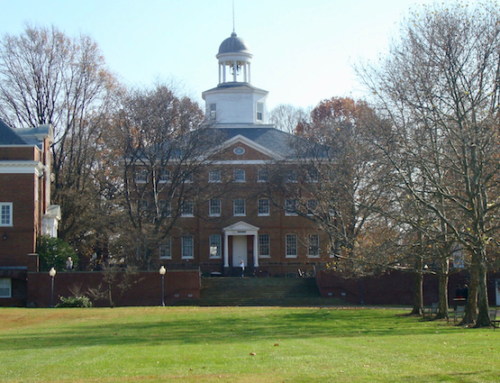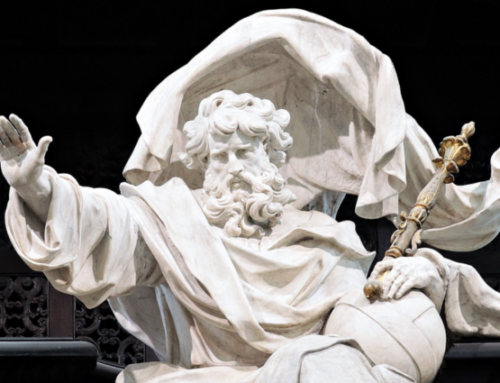You have studied the very best things, have done so with discipline and with rigor, and you have accomplished much. My sincere congratulations to each of you.
I’m honored to have been asked to address you today, but I must tell you that framing this message has been difficult. You enter a troubled world. And not only that, you enter a part of the world that is especially vexed: American higher education. So, to what subject and purpose shall these remarks be addressed? Shall we discuss the challenges you will face in college this fall, and the opportunities that await you; or should this time be spent looking to the broader national malaise that has overtaken us?
When in doubt, we turn for clarity to sports, of course, so let’s start with this penetrating insight from baseball great, Ted Williams, the home run king of the mid-20th century. Williams pleads, “If you don’t think too well, try not to think too often.”
There it is. A start. We want you to think well and often. The point bears mention, of course, because the difficulties we face as a nation, and the difficulties which you will face in college this fall, were caused in no small part by successive generations of leaders who did not think well. It’s not so much that they lack acuity or native intelligence. Rather, they have lost track of which ideas bore good fruit and which ill.
Having marched up the long and arduous road from 1776 to unprecedented freedom and prosperity, we as a nation have forgotten the ideas on which this freedom and this prosperity were first built. The danger is real and it is present. We stand to lose the blessings of liberty, if we do not reclaim those principles and habits without which those blessings cannot stand. This is an urgent concern for you, because the national conversation about ideas is especially pointed and especially off-track in our colleges and universities.
But let’s back up a bit. Is it really possible that intelligent and educated Americans have forgotten or abandoned the ideas that bring freedom and prosperity? And is it really possible that they have embraced instead ideas that lead to impoverishment? Here’s a test. Does an idea tend to enhance prosperity, freedom and human dignity? Or does it betray these things?
By this standard, Communism is a monstrous ideology. Historians estimate that Stalin murdered between 12 and 50 million of his own citizens. When asked, Stalin insisted, as if it expunged his guilt, that he had murdered only 12 million. Other totalitarian regimes leave similar legacies. Hitler’s Germany lives in infamy. Kim Jung Il’s North Korea ignores the most basic human rights, and teeters between humanitarian crisis and nuclear belligerence. Radical Islam, another totalitarian ideology, promises a world of enslavement, especially for women.
And yet, the ideas of communism and totalitarianism thrive in this world, and in our own country. And they thrive against the record of freedom.
What, then, is the record of freedom? Since the American founding in 1776, the free world, that part of the world that embraces the ideas of freedom, has created and made widely available the electric light, radio, television, automobiles, airplanes, antibiotics, advanced surgical technique, and telecommunications. And it has virtually eliminated starvation in the free world. It is estimated that in just the past 30 years, 800 million souls have escaped poverty because of the ideas of freedom.
And yet, despite the horrific legacy of totalitarian regimes, and the miracles of freedom, millions embrace Communism, and radical Islam. Even here, in the United States these ideas find wide acceptance.
Where, you ask, is this leading? My point is this. Here at Hillsdale Academy you’ve developed intellectual discipline and you’ve studied many things. Most especially you’ve studied important ideas, heroic literature, critical science and math, and you’ve studied the ideas on which freedom and prosperity are built. You are ready for the rigors of college, and your intellectual foundation has been carefully laid.
As you enter college, though, you will spend more time with other ideas. They will be exciting and new, and they will be raised by professors who believe them with all their hearts. The temptation, the natural inclination, will be to trust those professors and follow their lead.
I would encourage you to consider this: study those ideas respectfully and honestly, but as you do, ask: What are the fruits of these ideas? Where do they lead? What is their record? What legacy do they leave behind?
Remember; the ideas of Marx, Engel and Nietzsche lead directly to the genocides of Hitler’s Germany and Stalin’s Russia. The ideas of freedom, the ideas of Adam Smith and James Madison, lead to prosperity and human dignity.
So, yes, study the world of ideas, but do so with discernment and with caution. Easy it is indeed to be seduced by interesting and new ideas.
Recall Christ’s words in Matthew: “I send ye forth as sheep in the midst of wolves. Be ye then as wise as serpents and as harmless as doves.” Wise as serpents; harmless as doves. Take the time one day to unpack these metaphors. Christ urges us to be not clever like the thieving fox that steals in the night; but wise like the serpent, which strikes quickly and can be deadly, but which strikes only in self-defense or in need. And not harmless as the vulnerable and defenseless lamb, but harmless as the quick and wary dove.
More specifically, continue to study the ideas of freedom; and study the virtues without which they cannot exist. Recall the admonition of John Adams: “Statesmen…may pine and speculate for liberty, but it is religion and morality alone which can establish the principles upon which freedom can securely stand. The only foundation of a free constitution is pure virtue.”
So, yes, study new ideas, but ask yourselves where they lead; and what habits do they instill in their citizenry.
Conclusion: You and your nation stand at a watershed, a time of transition. Like all transitions, this one is ripe with opportunity and with risk. Happily, the path to health for both our nation and for you is clear. It is the same path.
Develop the moral imagination, and ask what good can you do in this world. Right here, right now, you can make your part of this world a better place. A kind word. A helping hand. An understanding smile. We were made in the image of God and are capable of tremendous goodness. But we need to think well even in this, for misguided charity brings unintended harm. Easily enough, the hand of charity creates the habit of dependence. Give of yourself, but give wisely. Charity to those in need is good; charity that teaches self-reliance is better. Even goodness requires prudence and wisdom.
And grow in virtue. Study it. Practice it. Teach it to your children. The strength of this nation was built by men and women of virtue. They were not perfect, of course, but when they erred they knew that their weakness risked not only their own happiness, but the success of the young republic for which they had sacrificed so very much.
In short, continue on the path you have started. Be prudent. And strong. And with time, wise. Grow in virtue and in faith.
And remember all of us here at Hillsdale Academy who love you well.
Thank you for your kind attention, and for your good and hard work. We all are very proud of you and wish you the very best.
Books on the topic discussed in this essay may be found in The Imaginative Conservative Bookstore.







Applause!
Amen!